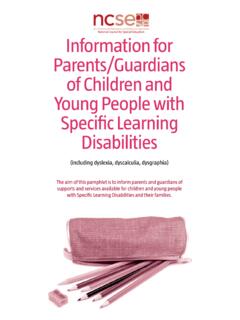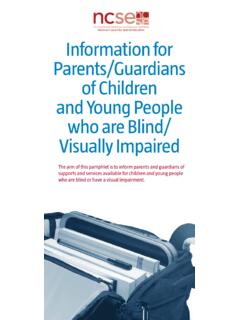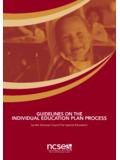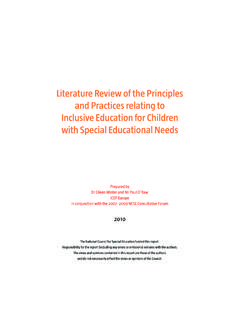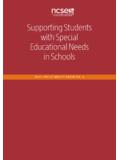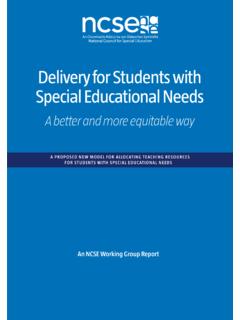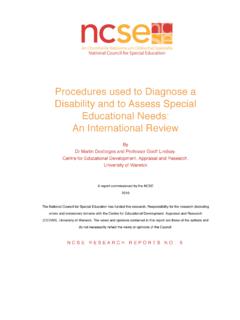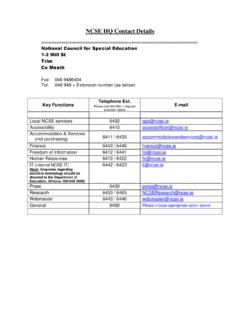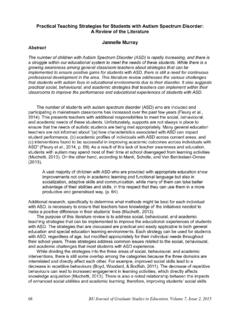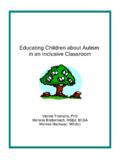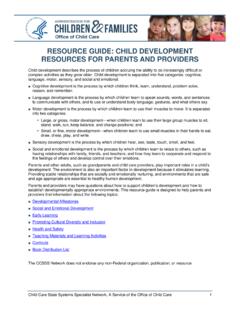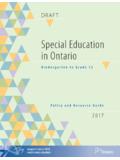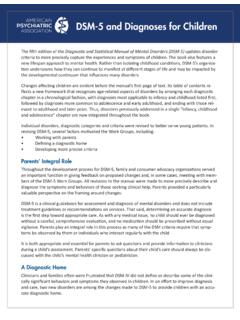Transcription of Parents of children with ASD - NCSE
1 Report to the National Council for Special Education Special Education Research Initiative Parents of children with autistic spectrum disorders (ASD): A Survey of Information needs. Tara Murphy and Kevin Tierney Disclaimer The National Council for Special Education funded this research. Responsibility for the research (including any errors or omissions) remains with the authors. The views and opinions contained in this report are those of the authors and do not necessarily reflect the views or opinions of the Council. 2 CONTENTS Page Executive Summary 3 Chapter One Introduction 7 Chapter Two Methodology 10 Chapter Three Results 17 Chapter Four Discussion 54 Bibliography 61 Parents OF children with ASD 3 EXECUTIVE SUMMARY The primary aim of this study was to explore the information and education needs of Parents of children with autistic spectrum Disorder (ASD).
2 Methodology Six focus groups with Parents of children with ASD, were conducted over a two-month period in 2005. Focus groups lasted for approximately two hours each and took place in the evenings. A total of 27 mothers and 11 fathers participated. The focus group questions emerged from a literature review of Parents experiences of having a child with ASD and Parents perceptions of their information and education needs. Literature pertaining to focus group interviews (Kruger, 1988; Merton et al. 1990; Morgan, 1997; Vaughn, 1996) was also reviewed. In addition, advice and guidance was obtained from two experienced lecturers/practitioners who each directed and ran several focus group interview projects within their own departments. The topic guide devised for these focus groups addressed the following questions: 1) What were Parents experiences immediately following the diagnosis of their child with an ASD?
3 2) What were Parents past and current information and education needs? 3) What were Parents primary sources of information? 4) How satisfied were Parents in terms of the quantity and quality of information offered to them? Finally, 5) What were Parents preferred sources of information? Summary of Findings The difficulties experienced by participants at the time of diagnosis appeared to be compounded by the way in which the diagnostic process was handled by the professional(s). Moreover, Parents of younger children who are likely to have EXECUTIVE SUMMARY 4 struggled to have their child s past and current needs met may anticipate a similar struggle in terms of having their child s future needs met. Many Parents stated that it would have been helpful if the diagnosing professional(s) informed them about the positive as well as the negative aspects of the ASD and how it might impact not only on the child s development but on the family s way of life.
4 It is also possible that too much negative information may be inappropriate at this time and that this added further stress and anxiety to an already delicate situation. During the diagnostic process, Parents reported having to deal with several professionals and services at the same time which often led to more stress. Similarly, Parents felt that the lack of collaboration among service providers and professionals was somewhat responsible for their having to discover themselves which needs were met by the different services. Parents experiences around the time of the diagnosis may predict future family adaptation to the ASD, parental stress, Parents information and learning needs as well as the quality of the parent-professional relationship. In light of this, the diagnostic process appears to have an all-encompassing influence on Parents perceptions, experiences and sense of empowerment in the immediate and long-term future.
5 Despite the family s GP or the public health nurse being the first point of contact for many families, neither of these clinicians was perceived by Parents to be helpful in terms of being able to answer specific questions or provide them with practical information on ASDs. Parent participants reported having significant information and education needs before, during and after the diagnosis. Indeed, education was a high information priority for Parents in this study. Parents also reported wanting practical advice on how to apply what they learned from books or training programmes to everyday living with their child. In terms of the child s future, many Parents were concerned about the child s level of independence and their ability to maintain relationships. Parents were also worried about what would Parents OF children with ASD 5 happen to their child if they themselves became ill and could no longer take care of them.
6 The majority of parent participants stated that meeting other Parents of children with ASDs who had or were experiencing similar difficulties was beneficial and that strategies should be put in place to facilitate this. Most parent participants searched intensely for information following the diagnosis including attending as many lectures and seminars related to ASDs as possible. Others reduced the intensity of their search for information subsequent to the critical period subsiding. This may indicate that while all Parents searched intently for information prior to and after the period of the diagnosis, only some remain active information-seekers. Different Parents may have wanted and benefited from different amounts of information. Therefore, professionals and service providers need to be aware of the potential variability in Parents information coping styles if they are to effectively meet the information and education needs of Parents .
7 The themes identified in this study will now be used to inform future quantitative investigations of information needs and their correlates. Conclusion and Relevance for the Sector This study highlights some failures in the provision of effective information and education services for Parents of children with ASDs. The provision of accurate, reliable and relevant information should be based on a multidisciplinary approach where it is shared and made accessible through health, educational and legal organisations. Information may equip Parents with the knowledge, skills and confidence to advocate for their child with ASDs. Although it cannot guarantee that families will be allocated appropriate services and support relevant to their child s needs, it may help them to face potential challenges and problems with a greater sense of empowerment.
8 EXECUTIVE SUMMARY 6 Many of the concerns and information needs expressed by Parents involved a need for more information about educational provision for their children . Other concerns related to more general provisions. It is imperative that those involved in education should be aware of these concerns and needs. It is intended to disseminate this information through conference presentations and peer reviewed publications. Parents OF children with ASD 7 Chapter One Introduction When a child is diagnosed with a physical disability or a developmental disability, Parents are often thrust into a flurry of emotions. Experiences around the time of the diagnosis, particularly in relation to the manner in which the diagnosis is disclosed or managed by professionals, can have a significant and long-term impact on Parents psychological wellbeing.
9 For example, Parents level of satisfaction with disclosure of the diagnosis may be associated with the structure, manner and level of information offered to Parents during this time (Baird, McConachie and Scrutton, 2000). According to Stoner (2005), Parents first reaction following a diagnosis is to look for information and practical advice. This response, be it immediate or gradual, brief or intense, is thought to facilitate adjustment and adaptive coping (Beresford, 1994; Lazarus and Folkman, 1984a, 1984b; Whitaker, 2002). Searching for information may also be an alternative way of handling the diagnosis as opposed to seeking emotional support (Seligman and Darling, 1997). It may help Parents to respond more effectively to a range of life-changing events that may invoke stress (Starke and M ller, 2002; Stoner, 2005).
10 It may also give Parents a greater sense of empowerment in managing daily routines and activities (Nachshen and Minnes, 2005; Shepard and Rose, 1995) as well as increase family adaptation (Heflinger and Bickman, 1997; Lam 2003). Several studies report that for Parents of children with ASDs, life proves more difficult and frustrating than for Parents of children with a long-term illness or developmental disability (Bouma and Schweitzer, 1990; Koegel and Schreibman, 1992; Randall and Parker, 1999). Parents may experience increases in stress, depression, anxiety, financial difficulties or relationship problems as well as decreases in self-competence and self-confidence (Fitzgerald et al. 2000; Symon, 2001). This may be caused or exacerbated by a combination of factors including an overall lack of information. When individuals access unhelpful information, this may frustrate them even further (Nicholas and Marden, 1997).
